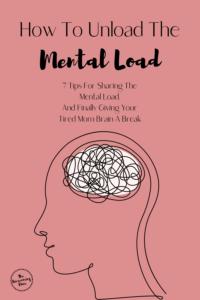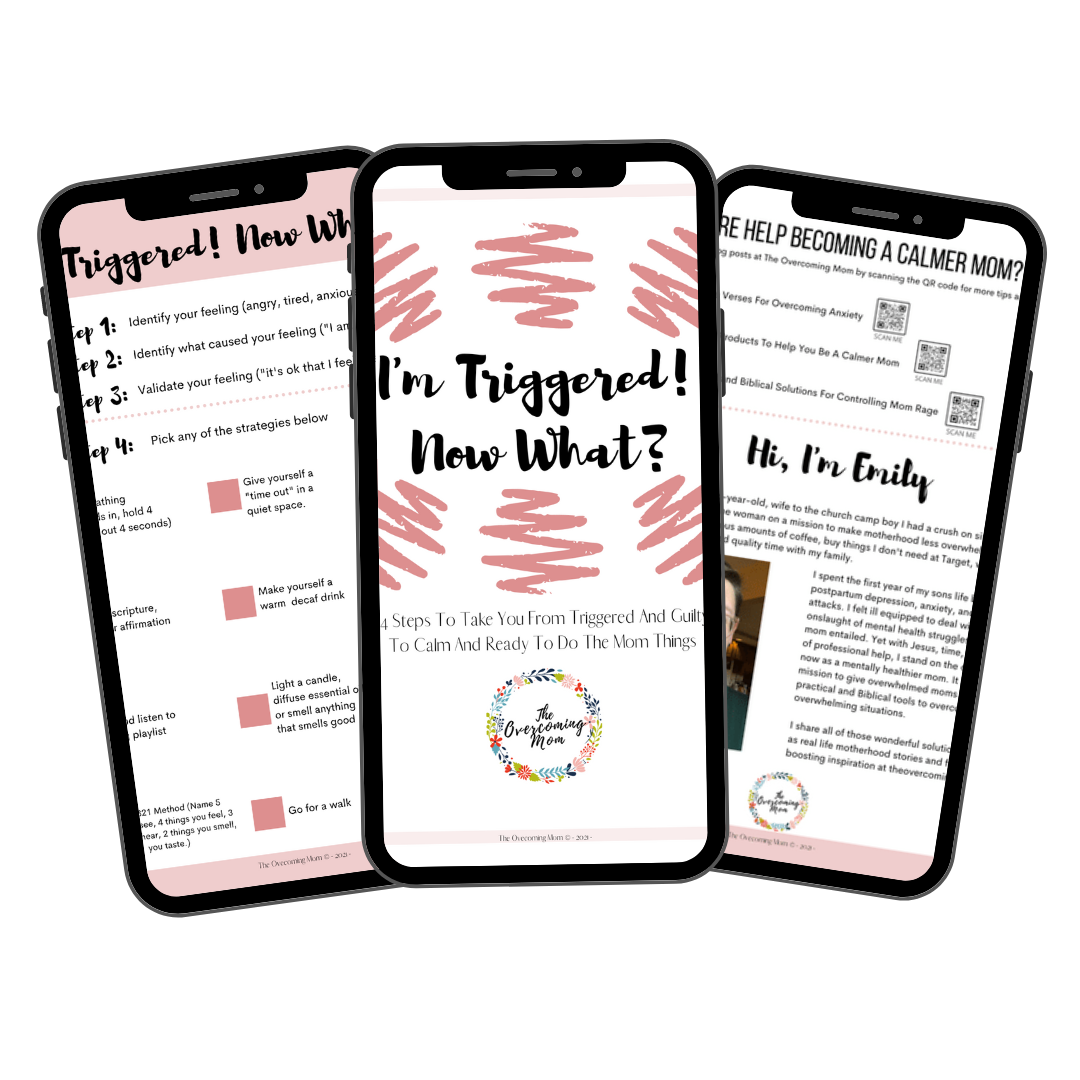This page may contain affiliate links. As an Amazon Associate I earn from qualifying purchases. If you want more information, please see my Affiliate Disclosure.

If there is anything I hear moms struggling with the most, it’s gotta be the mental load. Unless this is something you experience first hand, it can be hard to understand. Every mom I know, including myself, seems to struggle with the endless checklists forming in their brain. Even with help around the house, many moms are still overwhelmed. Why is that? It’s because bearing the mental load is an invisible task that seems to always default to mothers.
A study shows that nearly nine in 10 mothers in committed partnerships say they feel solely responsible for organizing the family’s schedules. Even if their spouse is helpful with other tasks around the house, mothers feel responsible for being the brain of the house. This has led to an epidemic of stressed out moms, trying to juggle the lives and schedules of an entire household, all while neglecting their own needs.
A report by Bright Horizons similarly found 72% of working moms feel it’s their job to stay on top of kids’ schedules. 52% are facing burnout from the weight of these responsibilities.
This is not ok. We can’t just sit here and pretend that this is just a “part of the job.” So where do we start in juggling and sharing the mental load? Perhaps the best place to start is understanding more of what actually is the mental load.


The Physical Load VS. The Mental Load
Even a helpful and loving spouse can be confused by the weight of the mental load. This is because there are plenty of spouses out there who do offer their help around the house, but don’t think beyond just doing the thing and checking off the box.
Here’s what I mean. Let’s say your child’s birthday party is coming up. A spouse may be totally willing to buy the food, put up the decorations, and do the physical work in prepping for the party, but who is usually left with the mental work? Research shows most of the mental work of preparation falls on the mother’s shoulders. The mom in this situation is left with the mental load of remembering how much stuff to get, whose been invited or not, all the presents, finding and securing the location of the party, etc. Even though she may be sharing in the physical load, she is holding the mental preparation all on her shoulders.
The mental load can feel much harder to carry than just having a lot of physical tasks to check off a list. This is because with mental tasks, there’s lots of predictions, planning, and preparation that happens behind the scenes most of the time. A spouse may see cooking dinner as simply a physical task, but what’s the invisible mental load behind that? Remembering whether there’s enough ingredients, how long it takes to actually cook the meal, wondering if your child will actually eat it, planning potential backup meals in case something goes wrong, whose going to clean the dishes afterwords, etc. For every one physical labor box that gets checked by a partner, there’s often ten mental boxes that get checked by the mom.
This is why the mental load is often a confusing and complicated thing to share with our spouses. It’s because we can’t simply write it all down on a piece of paper or send it in a text, it’s all the brain power that happens between the lines of a to-do list.
So how can we share the brain power with our spouse? If only physically handing our brain to our husbands was an option! Unfortunately, we have to get more innovative than that.
Help Your Partner Understand What The Mental Load Actually Is
Like I stated before, the mental load can be hard for partners to understand because it is invisible. So how can we give our spouses a sneak peek in our brain?
This comic titled “You Should Have Asked,” does a tremendous job of summing up what the mental load looks like. Maybe share this with your husband, discuss it, share examples of how similar situations pop up in your regular life.
This viral essay published in Harpers Bazaar is yet another great example to share with your spouse. Just like wit the comic shared above, consider reading it together, discussing it, and sharing examples of how situations similar to these have happens in your life.
Role playing can be an effective tool in helping your spouse understand your mental burden. Give them an example of something you regularly carry. I like using the “what’s for dinner?” question as an example. Give them a chance to play out all of the mental preparation that comes with that simple question. See how they react to it, and discuss what was difficult or not difficult about it. Giving your spouse a walk in your shoes, even if it’s just in theory, can open their eyes to see how heavy the mental load can really be.
Agree On A Way To Divide Up All Of The Labor Fairly
For many couples, simply splitting the chore list down the middle works fine for them. Others need the lines drawn more clearly. When discussing managing your home with your spouse, don’t simply focus on whose going to do the physical work, but whose doing the mental work of each task.
For example, if your husband is responsible for the weekly grocery shopping, will he also be responsible for creating the shopping list? Is he going to be the one to put in the pickup order, or will he go to the store? Don’t look at your to do list as a list of physical tasks, but break down the mental tasks that are laced into the physical tasks.
Related: “9 Tips for Resolving Marriage Conflicts.”
Have Both You And Your Partner Agree On What Is The Gold Standard Of Functionality In Your Home
Sitting down with your partner and establishing family values is an incredible activity to do, but take it a step farther with household duties.
Break down and agree on expectations for each thing that needs to be done in the house. Let me give you an example:
Let’s say it’s your husband’s responsibility to take out the trash. Sounds simple enough, but if you’re finding yourself metaphorically holding your spouses hand, then you may need to outline the mental checklist behind the physical task. Here’s what the mental checklist may look like when it comes to taking the trash out:
- How often should it be done?
- How full is too full?
- When is trash day? When should the trash be taken to the curb?
- Who will bring back the cans and when?
- Do we need trash bags? How will I let the person who grocery shops know we need trash bags?
- What needs to be recycled? How do we like to recycle? What’s the recycling guidelines for my community?
If you’re not used to thinking this way, this might feel like micromanaging. In fact, if your spouse isn’t super open about this mental load conversation, they may find this ridiculous. But trust me! When the gold standard of functionality is outlined clearly, there’s less room for frustration. There won’t be the need to babysit your husband when he does help out, because you’ll both agree on what the expectation is.
Keep communication open, easy, and accessible. And there’s an app for that!
We probably all know that communication is key for successful marriages. In our current day and age, one would think with texting, social media, and countless communication apps that we would be better at communication! Unfortunately, relationships tend to fall apart when things aren’t communicated, including what needs to be done around the house.
There’s a ton of ways you can keep communication open between you and your spouse. Of course you can use timeless pen and paper, or simply texting each other when something arises, but technology has come a long way in helping sync families together. So let’s use it to our advantage!
Project management apps, such as Airtable, can be great tools for families to use. You can share grocery lists, chore lists, family commitments, etc. Plus, you can assign people to certain tasks. If actual project managers survive and do their paid jobs with these kinds of apps (mind you, a project manager is basically doing what you’re doing, but they get paid for it,) then by golly you can too!
Cozi is similar to Airtable, but it is specifically designed for families. It has shopping lists, to-do lists, and a recipe box that anyone that’s in your “family” can add to. This is what my husband and I use, and it is an absolute game changer! No matter where he is, he can add things to our grocery list, or know what we need at the store. We can also share our calendars, so we’re always in the know of what’s happening in each other’s day.
If you’re more of a pen-and-paper type, then keep a family calendar. Or use visual aids to keep track of what needs to be accomplished and by whom.


Pick Your Battles
There are some moms who don’t care how something is done, as long as it gets done. Others want it done their way or the highway. Whichever version you are, be willing to understand that if you’re going to be handing over some control to your spouse, then they may feel more competent doing it their way. If their way isn’t your way, then figure out if it’s a battle you’re willing to fight.
For example, let’s say you give your spouse the job of vacuuming regularly. Is it worth the battle of insisting on a certain vacuuming technique, or is it ok as long as it gets done? Some of these conversations happen with the “find the gold standard” point mentioned above. There may be a time when you can’t agree on a gold standard though. Decide whether that standard you’re not agreeing on is a hill you’re willing to die on.
Be Willing To Renegotiate When Life Circumstances Change
A system you and your spouse develop now many not work a year from now, and that is ok. Sharing the mental load is an ever evolving process that you may be spending your entire life perfecting.
There may come times when you and your partner may need to revisit certain agreements, or change things up temporarily. Understand that is completely normal! When both you and your husband are willing to be flexible and renegotiate when necessary, the agreements you both made don’t feel like life and death. They feel like effective partnership.
Seek Help
Sometimes issues regarding the mental load can be so heavy and full of resentment that conversations without a third party involved may not be effective. If that is the case, then seeking the help of a professional may be exactly what your marriage needs.
Marriage Counselors are especially equipped at helping spouses understand and divide the different aspects of household labor. Even if you wouldn’t say your marriage is on-the-rocks, going to a marriage counselor is almost always a good idea!
Mediators can also be a great resource when it comes to dividing the physical and mental labor. XO Marriage offers faith-based marriage mediation by their certified mediators.
Resources For Understanding And Sharing The Mental Load
Sharing the mental load may take time for you and your spouse to figure out. Thankfully lots of wonderful resources have come out that can be very useful!
“Fair Play” by Eve Rodsky is an excellent resource on dividing labor in your home. If you’re wanting more help in starting this mental-load-sharing journey, this can be a great place to start.
I’ve also written a blog post called, “How To Get Your Husband To Help Around The House.” This offers even more tools on how to help your husband be more helpful in a non-nagging way.










